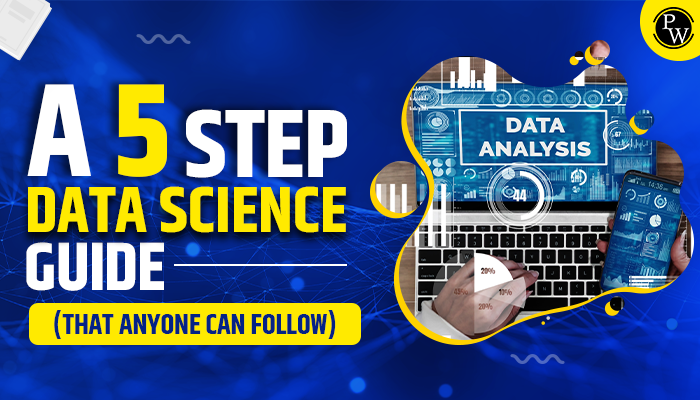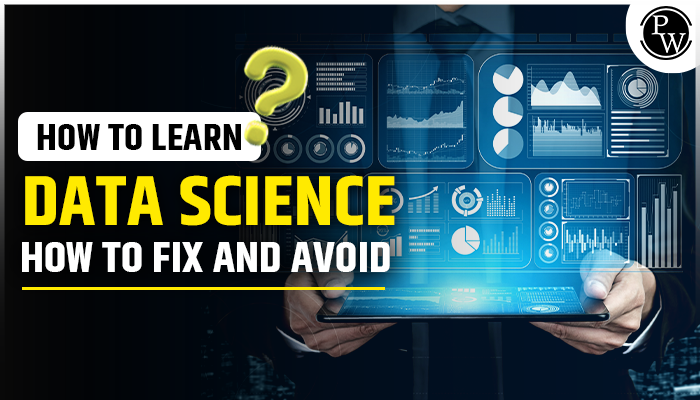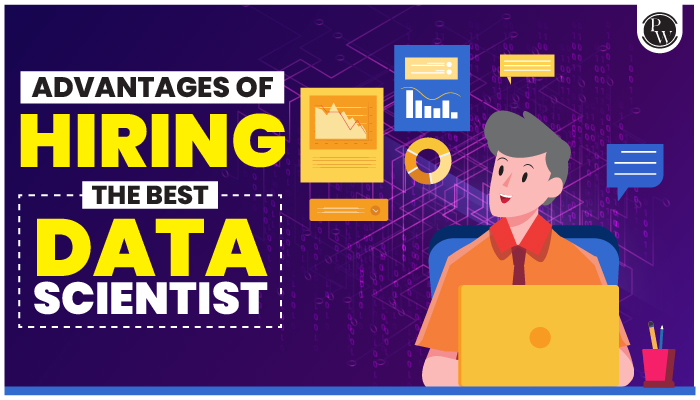Data Science Guide is an ever-growing field of study and career with great potential in the future times. Consequently, many students and people are now opting for data science training programs to learn this promising field with hopes of building a career as a Data Scientist.
Data Science Guide is an interdisciplinary or multidisciplinary academic field of study that involves the exploration of data to derive meaning for insights into the business. It involves understanding several science, technology, data management, and mathematics subjects.
Notably, it includes concepts of statistics, probability, scientific methods and processes, computing, and systems to extrapolate insights from structured and unstructured data.
PW Skills, India’s largest ed-tech skill-learning platform, provides effective and affordable Data Science courses and in-depth data science training. The aim is to make data science learning with all its core concepts and key topics easy and understandable.
Data Science Guide That Anyone Can Follow
A comprehensive Data Science Guide can help you navigate this field, whether you’re a beginner looking to get started or an experienced practitioner seeking to enhance your skills. Data science is a multidisciplinary field that combines skills in data analysis, statistics, machine learning, programming, and domain expertise. Here’s a step-by-step guide to help you embark on your data science journey:
Step 1: Understand the Basics
-
Define Your Goals: Determine your specific interests and goals within data science, whether it’s predictive modeling, data analysis, natural language processing, computer vision, or something else.
-
Prerequisite Knowledge: Acquire a strong foundation in mathematics (linear algebra, calculus, and statistics) and programming (Python and/or R).
Step 2: Learn Programming
-
Programming Language: Choose a primary programming language for data science. Python is the most popular choice, but R is also widely used.
-
Python Libraries: Familiarize yourself with key Python libraries for data science, such as NumPy, pandas, matplotlib, Seaborn, and sci-kit-learn.
-
Version Control: Learn how to use version control systems like Git and platforms like GitHub to manage your code.
Step 3: Understand Data
-
Data Collection: Learn how to gather data from various sources, including databases, APIs, web scraping, and files.
-
Data Cleaning: Master data cleaning techniques to handle missing values, outliers, and inconsistencies in your datasets.
Step 4: Explore Data
- Exploratory Data Analysis (EDA): Use data visualization techniques and statistical tools to understand your data, identify patterns, and gain insights.
Step 5: Learn Statistics and Mathematics
-
Statistics: Study statistical concepts such as hypothesis testing, probability, and regression analysis.
-
Machine Learning: Get a solid understanding of machine learning algorithms, including supervised, unsupervised, and reinforcement learning.
Step 6: Machine Learning
-
Feature Engineering: Learn how to preprocess and engineer features to improve the performance of machine learning models.
-
Model Selection: Understand different machine learning algorithms and techniques for selecting the right model for your problem.
-
Model Evaluation: Explore metrics for evaluating model performance and techniques like cross-validation.
Step 7: Build Projects
-
Hands-on Projects: Apply your knowledge by working on data science projects that reflect real-world problems. Start with simple projects and gradually tackle more complex ones.
-
Kaggle and Competitions: Participate in data science competitions on platforms like Kaggle to gain experience and exposure.
Step 8: Advanced Topics
-
Deep Learning: If interested in deep learning, delve into neural networks, convolutional neural networks (CNNs), and recurrent neural networks (RNNs).
-
Natural Language Processing (NLP): Explore NLP techniques for text analysis and sentiment analysis.
-
Big Data: Learn about distributed computing frameworks like Hadoop and Spark for handling big data.
Step 9: Stay Updated
- Continuous Learning: Data science is a rapidly evolving field, so keep learning and staying updated with the latest developments, tools, and techniques.
Step 10: Networking and Community
-
Join Communities: Participate in data science forums, attend meetups, and engage with the data science community. Networking can lead to collaborations and opportunities.
-
Online Courses and Bootcamps: Consider taking online courses or enrolling in data science bootcamps to accelerate your learning.
Step 11: Build a Portfolio and Apply
-
Portfolio: Showcase your projects and skills through an online portfolio or GitHub repository.
-
Job Search: Apply for data science positions, internships, or freelance opportunities that align with your interests and skills.
Step 12: Continuous Improvement
-
Feedback and Reflection: Continuously seek feedback on your work, reflect on your progress, and identify areas for improvement.
-
Mentorship: Consider finding a mentor who can provide guidance and advice as you progress in your data science career.
Remember that becoming proficient in data science takes time and practice. Be patient, stay motivated, and keep learning to excel in this exciting field.
Data Science is a multi-faceted field of study. It can be understood as a subject or discipline to study statistics, data, and related methods and techniques. Further, it can be pursued as a research field or a profession/career choice.
However, in one way or another, the main purpose of Data Science is to explore and understand noisy, structured, or unstructured data to draw insights into the business.
Statistics, Machine Learning, Visualization, and Deep Learning are the three core concepts of Data Science training courses. Data Science has become a complex field of study because of its varied concepts that come from multiple disciplines.
Consequently, it makes the study of Data Science typical for several students. However, with the right strategy and good guidance through the Data Science certification courses, this process of Data Science learning is made easy and useful.
Here is a 5-step guide covering all the requirements and working to become a Data Scientist!
Recommended Course
Full Stack Data Science Pro Course
Full Stack Web Development Course
A 5-Step Exclusive Guide to Become a Data Scientist
Identify the necessary skills of Data Science
Data Science is an interdisciplinary field of disciplines/subjects/studies. It is not one subject or topic. It requires knowledge of several concepts from different fields of study, such as statistics, machine learning, programming, data analytics, computing, etc.
Consequently, it becomes extremely important to identify all these skills, run a thorough background on them, and identify all of them and other concepts of the various subfields that are a must to learn Data Science.
Data Science training incorporates a deep understanding of the following skills and concepts.
1. A programming language (Python or R)
The first and foremost skill to master as a Data Science learner is a programming language (either Python or R).
As a matter of fact, most Data Scientists opt for Python and use it extensively in Data Science. This is essential because of the language’s versatile, simple, and easy-to-understand nature. Further, Python supports several in-built libraries, which makes the process much easier.
Subsequently, while learning Python and its concepts, it is equally important to learn about its in-built libraries such as Numpy, Pandas, Seaborn, etc.
2. Statistics and Probability
In order to become a Data Scientist, knowledge of statistics and probability is mandatory. This is also the reason why several Data Science training programs and courses involve statistics and probability learning.
As evident, statistics and probability help one analyze and interpret structured and unstructured data sets, get insights, and draw meanings from them.
Mainly, it incorporates concepts such as mean, median, mode, variance, standard deviation, population, sample, range, plotting, and graphs.
3. SQL
SQL stands for Structured Query Language. It is among the most important skills to learn and master, especially provided in most Data Science certification courses.
SQL is helpful in extra tracking and drawing meanings from large datasets. Significantly, it involves understanding important concepts and their use, such as the different types of normalization, joint operations, co-related questions, nested queries, etc., on data in raw format.
Further, Microsoft Excel or Python is used to clean this data.
4. Data Cleaning and Data Analytics
Data Cleaning is a major part of the program as a Data Scientist as most of the time goes into cleaning and arranging the given datasets. It involves using and understanding data sorting, functions, and formulas, tables, and charts, etc., in Microsoft Excel. Moreover, in-built Python libraries such as Numpy and Pandas are also useful in Data Cleaning.
The main job of data scientists is data analysis. Consequently, Data analytics is a quintessential skill taught in several Data Science certification courses and training programs.
Notably, it involves data arrangement, analysis, finding patterns and appropriate trends in datasets, drawing meaningful insights, etc.
5. Machine Learning
Machine Learning is a branch of Artificial Intelligence (AI) based on the idea that programs and systems can identify datasets and their patterns. Thus, machine learning is instrumental in automating the process of data analysis.
Evidently, it is a must-learn skill in Data Science.
PW Skills Provide Various Platform
Find resources and Data Science courses to learn.
Once you’ve identified the necessary skills, the next important step is to find optimum resources to learn and master these skills. Several Data Science Certification courses and various Data Science training programs are available on the internet.
However, it is in one’s best interest to learn and master these skills from the best resources.
PW or Physics Wallah Skills provides an intensive Data Science certification course for thorough and complete learning. The course comes with conceptual learning, live interactive courses, regular practice through practical tests, and guides on portfolio building to ensure success.
Learn consistently and practice thoroughly.
Whatever source or Data Science training or courses you may have chosen, be consistent in it and practice regularly.
Since concepts of Data Science are many and varied along with being complex, it is important to keep track of one’s study and continue learning regularly.
PW Skills Data Science Certification courses provide regular classes for consistent learning and practice tests to better understand all the concepts.
Build your portfolio as a Data Scientist.
Once you have mastered all the necessary skills, and practiced enough, know that you are halfway there as a data scientist. All you need is to showcase your talent and resume now.
Consequently, the next step is to build your portfolio and showcase some of your work in a perfect resume. These can be work you have performed in internships, academic projects, etc.
Evidently, you can add your certificate acquired from the Data Science certification courses you may have taken.
Apply to jobs/services
This is the final step and the most evident too!
Just look out for prospective jobs online and offlineData Science Guide through various sites and apply to them. Go through the selection process in which you are bound to succeed with your wonderful resume and the right attitude.
That is all. You will be a Data Scientist working for whatever firm or organization.
Conclusion
Summing up, Data Science is an intense field. It is complementary to it that Data Science is also an extremely demandable field of study. It involves concepts from several disciplines, such as data management and analytics, statistics and probability, machine learning, visualization, deep learning, etc.
Anyone can follow the above steps and incorporate the right skills mentioned above via Data Science Certification courses and training programs to become a Data Scientist.
Frequently Asked Questions (FAQs)
1. What is Data Science?
Ans: Data Science Guide is an interdisciplinary field of study that incorporates concepts from various fields such as statistics, machine learning, data analytics, management, etc. Furthermore, it is a research field and a renowned profession/career.
2. What exactly do data scientists do?
Ans: A Data Scientist is a person who practices Data Science. The main job of a Data Scientist is to analyze data and draw meaningful insights from them for actionable use in business. It is a mix of statistics and probability in which data is identified and analyzed to predict its use for profits in an organization.
3. Which is the best course to learn Data Science?
Ans: The PW Skills Data Science course is one of the best courses available to learn and master Data Science. With more than 50+ industry real-time projects, the PW Skills Data Science course provides complete insight into all core concepts of Data Science.
Notably, it is an intensive online master’s course in Data Science that is affordable, effective, and reliable. It incorporates real-time projects for practical learning and a thorough conceptual understanding of important concepts such as data analytics, machine learning, etc.
The best part is that it provides 2-year dashboard access and is instrumental in job assistance reassuring success as a Data Scientist.
Recommended Reads
Data Science Interview Questions and Answers
Data Science Internship Programs






